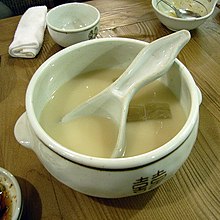Makgeolli
| Makgeolli | |

A bowl of makgeolli.
|
|
| Korean name | |
|---|---|
| Hangul | |
| Revised Romanization | Makgeolli |
| McCune–Reischauer | Makkŏlli |
Makgeolli(막걸리), also known as makkoli (English pronunciation: /ˈmækəli/), is a slightly sweet alcoholic beverage native to Korea. It is made from rice or wheat mixed with nuruk, a Korean fermentation starter. It has a milky, off-white color and has about 6–8% alcohol by volume. Makgeolli is traditionally made from rice, although some variants are made from wheat, and some brands are flavored with corn, chestnuts, apples or other produce.
The name makgeolli is a compound word that consists of a prefix mak- ("roughly, coarsely, recklessly, carelessly") and a deverbal noun derived from the verb georeu- ~ geoll- ("to strain, to sift, to filter"). It was originally quite popular among farmers, earning it the name nongju (농주 / 農酒), which means farmer liquor. However, it has recently become more popular in cities, especially with the younger generations. Dongdongju (동동주) is a drink very similar to makgeolli, and both are commonly imbibed alongside Korean pancakes such as pajeon (파전) or bindaetteok (빈대떡).
According to The Poetic Records of Emperors and Kings (Jewangun-gi), written during the Goryeo Dynasty, the first mention of the drink was in the founding story of the Goguryeo during the reign of King Dongmyeong. Many communities in Korea around that time enjoyed the tradition of drinking and dancing all night in special ceremonies. During the Goryeo dynasty, makgeolli was called ihwa-ju (pear blossom alcohol), as the liquor was made during the blossoming of that particular flower.
...
Wikipedia
